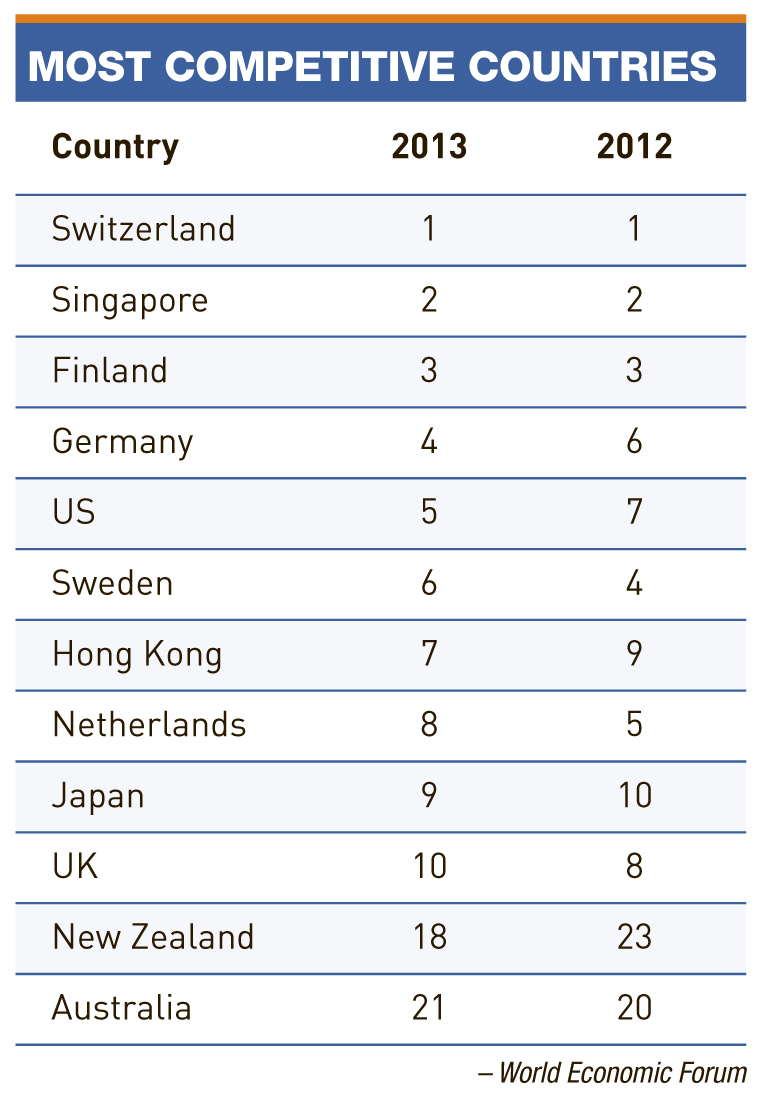NZ leaps Australia in world competitiveness rankings
New Zealand has climbed five places to 18th in the World Economic Forum rankings while Australia has slipped one place out of the top 20.
New Zealand has climbed five places to 18th in the World Economic Forum rankings while Australia has slipped one place out of the top 20.
New Zealand has outperformed Australia on the latest Global Competitiveness Index for the first time, the World Economic Forum (WEF) says.
New Zealand has climbed five places to 18th, while Australia has slipped one place to drop out of the top 20 for the first time with a ranking of 21st.
The Global Competitiveness Report is compiled from 111 indicators, categorised into 12 pillars of competitiveness in four main sub-indices: basic requirements, efficiency enhancers, and innovation and sophistication factors.
The world rankings for the first four countries were unchanged (see table) with Switzerland – home of the WEF –ranking top for a fifth year running.
Germany, the US, Hong Kong and Japan improved their rankings the top 10 while Sweden, the Netherlands and the UK fell.
The WEF says excellent innovation and strong institutional environments are becoming increasingly important in influencing a country’s competitiveness.
While New Zealand scores highly in the second category – ranking among the top 10 for the quality of its institutions, health and primary education, higher education, goods and labour market efficiency, and financial markets development – it has failed to improve on its innovation and business sophistication factors, ranking 27th globally.
Dr Oliver Hartwich, executive director of the New Zealand Initiative, which contributed to the report, says this is no reason for complacency; the 27th ranking is behind both Puerto Rico and Qatar.
“We need to focus on boosting our capacity to innovate and in areas of the economy besides our traditional agricultural strengths,” he says.
“The urgency for this is underscored when you consider that Switzerland, which was ranked second in the world for both innovation and business sophistication, was named the most competitive economy in the world for a fifth year straight.”
Reasons for improvement
He says New Zealand’s overall improvement reflects the steady recovery of the local economy and prudent pro-growth policies that have been put in place to support it.
That contrasts with Australia, which is New Zealand’s second biggest trading partner, where deteriorating labour market conditions (ranked 54th globally, down 12 places from last year) and a heavy regulatory burden (ranked 128th in the world) weighed on the country’s competitive ranking.
“The performance is more startling when you consider that just five years ago New Zealanders were staring at ballooning deficits and a deep recession while the Australian government was debt free and riding the tailwind of a mining boom,” Dr Hartwich says.
International highlights
The US continues to be a world leader in bringing innovative products and services to market. Its rise in the ranking is due to a perceived improvement in its financial market as well as greater confidence in its public institutions. However, serious concerns persist over its macroeconomic stability, which ranks 117 out of 148 economies.
Of the five BRICS, China (29th) continues to lead the group, followed by South Africa (53rd), Brazil (56th) India (60th) and Russia (64th). Only Russia improves its ranking, climbing three places, while Brazil drops eight places.
Among the Asian economies, Indonesia jumps to 38th, making it the most improved of the G20 economies since 2006, while Korea (25th) falls by six places and Taiwan (12th) remains in the top 20.
Malaysia is 24th while countries such as Nepal (117th), Pakistan (133rd) and Timor-Leste (138th) are near the bottom of the ranking. Bhutan (109th), Laos (81st) and Myanmar (139th) join the index for the first time.
In the Middle East and North Africa, Qatar (13th) tops the region’s rankings, with the United Arab Emirates (19th) entering the top 20 for the first time. Saudi Arabia (20th) falls two places but remains among the top 20.
Israel ranks 27th. Egypt (118th) drops a further 11 places on last year’s index. Bahrain (43rd), Jordan (68th) and Morocco (77th) also decline. Algeria moves up to 100th place and Tunisia re-enters the index at 83rd.
Despite robust economic growth in previous years, Latin America continues to suffer from low rates of productivity and the results show overall stagnation in competitiveness performance. Chile (34th) continues to lead the regional rankings ahead of Panama (40th), Costa Rica (54th) and Mexico (55th), which all remain relatively stable.

Sign up to get the latest stories and insights delivered to your inbox – free, every day.